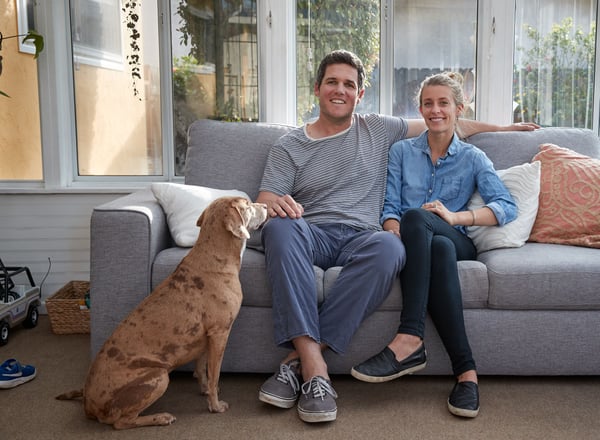There are a lot of surprises with fostering young children. But one thing foster families can count on is people telling them they “could never do that.” The reason is always the same: they would get too attached to the children in their care.
 Karli and Justin have a message for those folks: People who grow attached to children are exactly the type who should foster.
Karli and Justin have a message for those folks: People who grow attached to children are exactly the type who should foster.
As two toddler boys bustle about their Golden Hill home, the couple explains why fostering “Baby J” has been a positive experience for both of them and their three-year-old son, Emerson. “They are buddies,” Justin says. “I am 100 percent attached and love them exactly the same.”
The boys have an easy friendship, enjoying activities like building blocks, coloring, biking, and playing ball. They each have their own baby dolls and love to settle in for story time. Karli says she’s looking forward to the family’s upcoming move to a home with a backyard so the boys can frolic outdoors. There is no doubt about it – the family is fully attached to Baby J.
Karli adds, “If we say goodbye, it will break our hearts, but I would do it a thousand times again to have had this time with him.” She says the whole family has learned and grown in the year Baby J has been with them. It has been an opportunity for Emerson to witness his family put its values into action. Having a little brother has also taught Emerson compassion and given him a way to express it. “We were worried about the adjustment and jealousy, but they’ve been close from day one. Emerson is very protective of him,” Karli says with a smile. “It’s beautiful.”
Another pleasant surprise for the family has been the close relationship they have forged with Baby J’s biological mother. “It was new territory for everyone at first,” Karli explains. “But after we met enough, we realized that we all love him so much and want him to thrive.” The couple says that reunification is the goal, but they plan to remain active in Baby J’s life. “We want to be involved in his life, but also in his mother’s, because we love her. She has a big personality, is energetic and funny, and has a beautiful heart.”
In terms of fostering young children, Karli and Justin have the best-case scenario. Justin laughs and adds, “I keep asking, is this what fostering is? Because it’s pretty easy." While it is not the norm, it certainly happens at Angels. Many families are able to stay in touch with their foster children after they reunify with their biological parents. A few have lifelong friendships with biological families. Some children are adopted by their foster parents, though the goal of fostering is always reunification.
The couple says that although fostering has been an overwhelmingly positive experience, it has its tough moments too. Justin says he likes the structure of schedules and plans, but many things are out of his control as a foster parent. “It’s a stretch for me to take things day by day, but I remind myself that we didn’t foster for me, we did it because there’s a child in need.”
As far as getting attached, fostering done well includes connecting deeply with children, loving them as your own, and often saying goodbye. As hard as that is, it’s worth it, Karli and Justin say. In the end, fostering means offering up your heart to be broken so a young child has a better chance at a healthy, stable, and joyful life.



